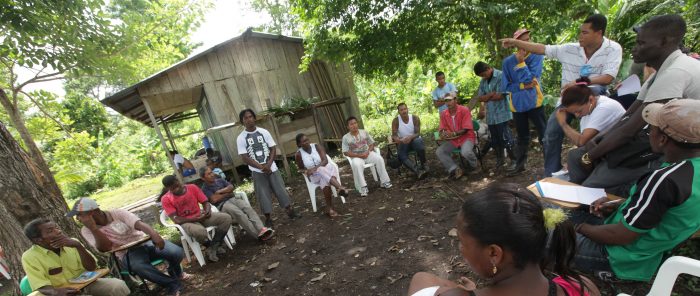
When countries gathered in Paris in 2015 to strike a new climate deal to come in place from 2020, they agreed that in the lead-up to 2020, they would take stock and assess the total level of greenhouse gas emissions released so far. Parties agreed to engage in a collective process to identify what will need to be done to prevent global warming from increasing above the dangerous 1.5°C temperature threshold.
With the government of Fiji presiding over the negotiations, this collective process was named the ‘Talanoa Dialogue’. ‘Talanoa’ is a word used across the Pacific to refer to an inclusive, participatory, and transparent dialogue.
The Talanoa Dialogue is scheduled to run through the year until COP24, and so a preparatory phase was scheduled to take place here in Bonn, during the interim round of climate negotiations. The first session of this dialogue took stock of where we are in terms of actions to reduce greenhouse gas emissions through a story-telling sharing process.
Understanding the difficulty of the international community to act together on climate change, an inclusive dialogue through the Talanoa seems so far to have offered a promising opportunity to build enough empathy and pressure for countries to increase their climate actions and ambitions.
However, while the process is well intended, there is no certainty that the dialogue will be carried out in all countries, neither does it ensure that the Dialogue will lead to more ambitious mitigation commitments. So far, the EU and the most vulnerable countries have called on all countries to ramp up their climate targets before 2020. The African Group along with some of the poorest countries have also called on countries with large historical emissions to increase their climate efforts well before the Paris Accord is implemented in 2020.
In October 2018, the international scientific community (IPCC) will release a Special Report on the 1.5°C global warming threshold. The Report will identify where the global cumulative emissions bring the international community in relation to the 1.5°C temperature target. It will also explore how to prevent reaching a 1.5°C temperature increase and how to remain below this temperature threshold. The leaked draft versions of the Report show that there is only a handful of years before overshooting the 1.5°C temperature threshold. In other words, there is absolutely no time to loose and inaction on climate change cannot be excused.
Given the significance of the 1.5°C temperature target, it is essential that the Talanoa dialogue is not only a talking exercise for countries to take stock of their emissions contributions towards the temperature goal, but that it is a dialogue with constructive outcomes. An example of a constructive outcome would be one where every country agrees to ramp-up their mitigation efforts, with some countries doing more to equitably reflect their contributions to global emissions i.e. industrialised countries and historical emitters.
Sticking to a differentiated world of classifying countries into two categories such as Annex 1 and non-Annex 1 as was done in the early 90´s would be unfair today. Countries that are profiting from fossil fuel extraction or from industrial production including, Saudi Arabia and China, must significantly increase their climate actions.
Due to their historical responsibility and their current levels of consumption and pollution, European and other Western countries must significantly increase their emission reduction plans as well as the support to developing countries so that they do not need to rely on fossil fuels as a means for development.
The next few months will present Civil Society and Churches a number of opportunities to engage with local authorities and national governments as part of the Talanoa Dialogue. This participation is key to build the momentum necessary for country leaders to agree to increase their mitigation commitments that were presented in Paris two years ago.
We need to work together in this Talanoa spirit for a safer future for all.
—
Written by Bruno Nicostrate, Policy Officer Climate Change and Development, ACT Alliance EU